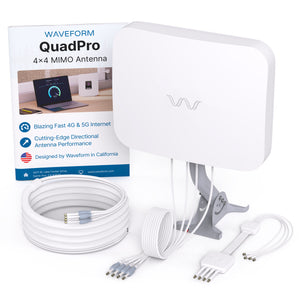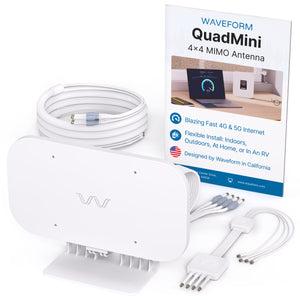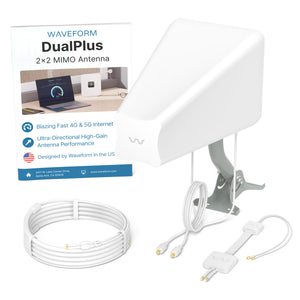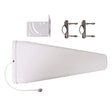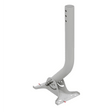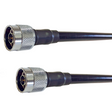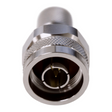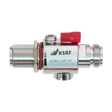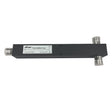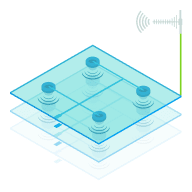Seattle is home to some of the most advanced manufacturing, logistics, and high-tech operations in the country, yet its wireless challenges are surprisingly down to earth. Large waterfront yards, multistory concrete warehouses in SoDo, and sprawling aerospace plants in Everett all share the same pain points: spotty WiFi outdoors, interference inside metal-clad structures, and the cost of thousands of public-carrier SIMs. One example that highlights these hurdles is the container-handling activity at the Port of Seattle, where reliable mobility for scanners, cameras, and autonomous vehicles is mission-critical but extremely difficult to provide with conventional wireless.
Why Seattle Organizations Are Turning To Private 5G
Seattle's economy spans aviation, maritime logistics, life sciences, cloud services, and higher education. Every one of those verticals depends on secure, low-latency connectivity:
- Boeing and the tier-one suppliers clustered around Paine Field rely on roaming handhelds, AGVs, and sensor networks across millions of square feet of mixed indoor-outdoor space.
- Cold-chain distribution centers in Kent Valley need uninterrupted barcode scanning through insulated walls that block WiFi.
- Hospital campuses on First Hill must isolate patient-data traffic while giving clinicians rapid mobility between buildings.
- Outdoor festivals at Seattle Center require pop-up connectivity for point-of-sale devices without flooding the open 5 GHz spectrum.
Private 5G, operating in the Citizens Broadband Radio Service (CBRS) band, solves all of these problems. Compared with WiFi 7, private 5G radios transmit at far higher power levels, cover several acres per radio, and use lightly licensed spectrum that is almost free from the congestion found in unlicensed bands. Compared with public LTE from AT&T, Verizon, and T-Mobile, a private network eliminates per-line fees, prevents outside traffic from consuming bandwidth, and lets you route data straight to your LAN for low latency and tight security.
Seattle's rainy winters and widespread use of concrete tilt-up construction further amplify these advantages. The 3.5 GHz CBRS signal penetrates walls better than 5 GHz WiFi, yet remains well contained to your property, preventing interference with neighbors. That mix of performance and predictability makes private 5G the preferred choice for enterprises across the Puget Sound.
How Private 5G Works And Why It Is Different
A private 5G network combines three elements:
- Radio Access: Small-cell radios broadcast in the CBRS band at up to 47 dBm EIRP, covering tens of thousands of square feet indoors or a mile outdoors.
- Core Software: A virtual or on-premises 4G/5G core handles subscriber authentication, quality-of-service policies, and local breakout to your existing LAN or cloud.
- SIM or eSIM Devices: Gateways, scanners, handhelds, security cameras, and IoT sensors connect using standard LTE or 5G protocols, ensuring seamless mobility.
Because the spectrum is dedicated to your organization, you control who connects, what traffic receives priority, and how data is secured. Latency can drop below 20 milliseconds since packets stay onsite. In contrast, public 5G routes traffic through the carrier's core miles away, adding delay and exposing data to the public internet. WiFi lacks strong mobility controls, so devices often lose sessions when roaming between access points.
If you are new to the technology, our Private Networks Guide offers a deeper dive into CBRS, spectrum tiers, and device options.
Our Proven Design And Deployment Process
Waveform delivers end-to-end simplicity:
-
Rapid Site Snapshot
Email us a floor plan or aerial image, your coverage goals, and the device mix. Within a few days we return a preliminary RF design, budget range, and deployment timeline.
-
Detailed RF Modeling
When you approve the budget range, our engineers create a full propagation model, bill of materials, and coverage heat-map specific to your site layout and construction.
-
Turnkey Deployment
We handle permitting, installation, SIM provisioning, and integration with your LAN or SD-WAN. Every installation ships live, with day-one coverage verified by post-install testing.
-
Ongoing Support
We remotely monitor the health of the radios and core, apply firmware updates, and expand capacity when your needs grow. A single SLA covers infrastructure and user devices.
Unlike many integrators that push a single vendor, we stay vendor-neutral. We regularly deploy small cells and cores from Celona, Highway9, Baicells, Airspan, Pente, and others. On the device side we supply Peplink routers, Cradlepoint gateways, Zebra scanners, Digi IoT sensors, and even "network-in-a-box" kits for temporary sites. You get the best-fit solution, not the only product on our shelf.
Local Experience You Can Verify
While private networks are new, our team is no stranger to complex wireless deployments in Washington. We recently completed a wireless upgrade for Metropolitan Market, a specialty grocery retailer headquartered in Seattle. You can read the details in our Metropolitan Market case study. The project demonstrates our ability to work around dense shelving, refrigeration units, and shopper traffic while meeting tight construction schedules, skills directly translatable to private 5G rollouts in industrial or campus settings.
What Does A Private 5G Network Cost In Seattle
Indoor turnkey pricing typically ranges from $1.00 to $2.50 per square foot, all-in. That figure includes site survey, engineering, small cells, core software, cabling, installation, SIMs, and a year of managed service. Outdoor coverage is where private networks really shine. Because each CBRS radio can cover a wide area, a 1.5-mile radius yard or port can often be served for as little as $100,000 depending on terrain and required throughput. Compared with deploying hundreds of outdoor WiFi APs or paying annual carrier data plans for thousands of lines, the ROI is compelling.
Ready To Explore Your Own Network
Waveform is a connectivity integrator that delivers turnkey Private 5G networks for enterprises throughout Seattle and the greater Puget Sound region. Call us at (800) 637-4049 or get a custom private 5g design and quote today. Let us show you how simple, reliable, and cost-effective private wireless can be.























